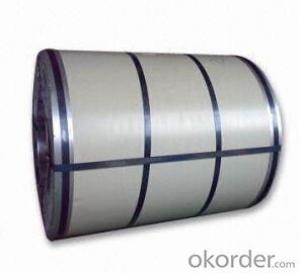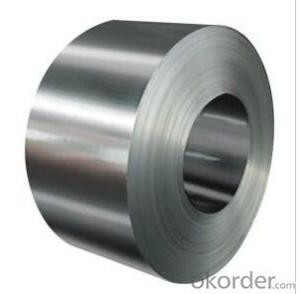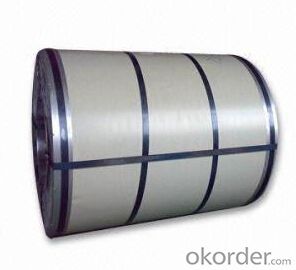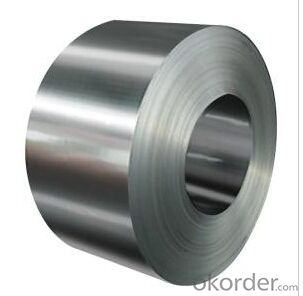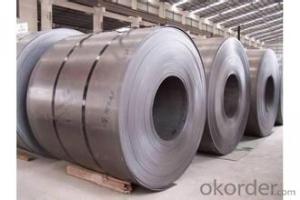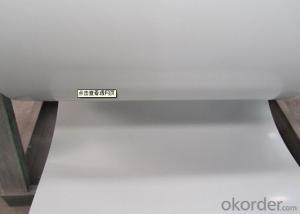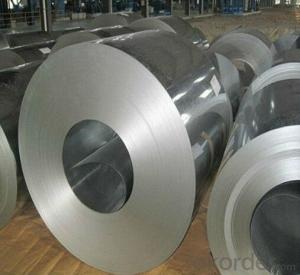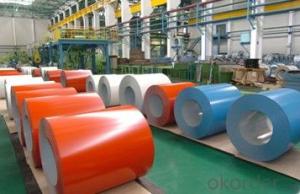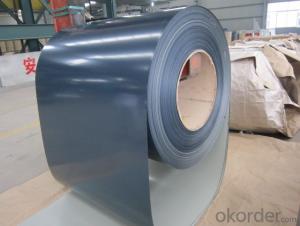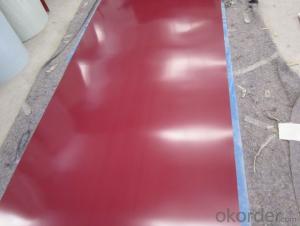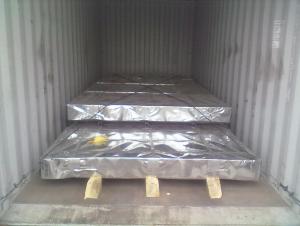Prepainted Zinc Coated Hot DIP Galvanized Steel Coils
- Loading Port:
- Tianjin
- Payment Terms:
- TT OR LC
- Min Order Qty:
- 25 m.t.
- Supply Capability:
- 10000 m.t./month
OKorder Service Pledge
OKorder Financial Service
You Might Also Like
Basic description Info.
Model NO.:Dx51d / Dx52d/ Dx53D/ S250, 280, 320gd
Surface Treatment:Galvanized
Technique:Hot DIP Galvanized
Standard:JIS
Steel Grade:SGCC
Model No.:Dx51d
Thickness:0.20mm to 3.0mm
Width:914mm, 1000mm, 1200mm, 1219mm And1250mm
Zinc Coating:Z50 to Z275
Coil ID:508mm
Coil Weight:4 Tons to 8 Tons
Capacity:10000tons /Year
MOQ:25 Ton Regular
Export Markets:South America, Eastern Europe, Southeast Asia, Africa, Mid East, Eastern Asia
Additional Info.
Packing:Export Standard Packing
Standard:0.16MM- 3.00MM * 1000/1250MM
Origin:China
HS Code:7210490000
Production Capacity:100000 Tons /Year
Product Description
Product Description of Prepainted zinc coated hot dip galvanized steel coils :
Thickness: 0.20mm to 3.0mm
Width: 914mm, 1000mm, 1200mm, 1219mm and 1250mm.
Zinc coating: Z50 to Z275
Coil ID: 508mm
Coil weight: 4 tons to 8 tons
Regular spangle, Min spangle and Zero spangle, chromated and light oiled or un-oiled.
Thickness tolerance: +/- 0.02mm or according to customer request.
The detailed information for the hop DIP galvanized steel strip is as following:
Thickness: 018mm to4.0mm
Width: 20mm to 750mm
Zinc coating: Z50 to Z275
Coil ID: 508mm Material: Q195, Q235 or by customer need.
Packing: Export packing with pallets.
Regular spangle, chromated and light oiled or un-oiled.
Thickness tolerance: +/- 0.02mm or according to customer request.
Packaging & Shipping of Prepainted zinc coated hot dip galvanized steel coils:
Standard export packing, 4 eye bands and 4 circumferential bands in steel, galvanized metal fluted rings on inner and outer edges, galvanized metal and waterproof paper wall protection disk, galvanized metal and waterproof paper around circumferece and bore protection.
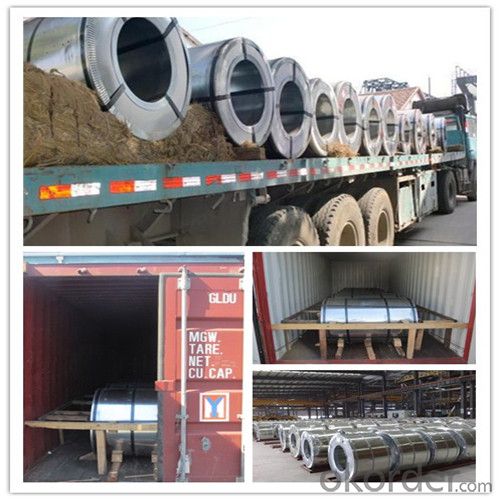
FAQ
1.What's your MOQ?
25MT, it is for one container.
2.Do you have QC teams?
Yeah, sure, our QC team is very important, they will keep the quality control for our products.
3. What's your normal delivery time?
Our delivery time about 10-20days for standard sizes, if you have other requirements like hardness and width ,it is about 20-40days. But don't worry ,we also try our best for the delivery time ,because time longer and our cost is higher.
4.Are the products tested before shipping?
Yes, all of our PPGI and GI was qualified before shipping. We test every batch every day.
- Q: I have never owned a non-stainless steel chef's knife and have been looking at some to buy recently, but all of them have various degrees of wear and use. They say that the wear is normal for non-stainless steel knives, but how can I tell if it is too much wear, or if the blade is clean?
- Carbon steel chef's knives out perform stainless in every aspect except 1, care. You can't put them in a dishwasher. Wash, rinse and dry off. Do not keep them in a drawer filled with other kitchen stuff, rather, keep them in a cabinet or block. If it starts to rust you can use steel wool to clean them up, or fine grit sandpaper if you want to retain a fine finish. For your viewing pleasure, a chef's knife I forged from crane cable.
- Q: Classify the following in as many ways as possible:stainless steelpureheterogeneous mixturehomogeneous mixturenone of these
- homogeneous mixture
- Q: How are steel coils used in the manufacturing of food packaging?
- Steel coils are commonly used in the manufacturing of food packaging as they provide strength and durability to the packaging materials. These coils are typically shaped into cans, containers, or lids, ensuring the preservation and protection of food products during storage and transportation. Steel coils help maintain the integrity of the packaging, preventing breakage or damage that could compromise the safety and quality of the food.
- Q: I bought a Remington 870 super mag last fall and wanted to to switch to non-tox steel loads. The gun came with a modified rem choke. I know that not all chokes are qualified to handle steel. It doesn't say anywhere on the choke no steel I was just wondering if anyone out there knew for sure that those chokes that the guns come with won't get damaged be steel.
- Remington 870 Full Choke
- Q: A roll of 1 meters wide color steel roll about how many tons?
- Generally speaking, it will be about 4 tons, the export may be larger, but 10 tons of papers have not yet seen
- Q: Can steel and/or stainless steel turn rusty ?
- Stainless is an alloy mixture the contains iron and nickel and does not rust.
- Q: How are steel coils inspected for surface finish after processing?
- Steel coils are inspected for surface finish after processing through various methods such as visual inspection, surface roughness measurement, and non-destructive testing techniques like magnetic particle inspection or eddy current testing. These inspections help ensure that the steel coils meet the required surface finish standards and are free from any defects or imperfections.
- Q: How are steel coils used in the production of containers?
- Steel coils are used in the production of containers as they are the primary material for manufacturing container bodies. These coils are shaped and welded into the desired container shape, providing strength and durability to the final product.
- Q: What are the different types of steel coil surface treatments for outdoor applications?
- For outdoor applications, there are several commonly used surface treatments for steel coils that enhance durability, corrosion resistance, and appearance. Examples of these treatments include: 1. Galvanized: This treatment involves applying a layer of zinc to the steel surface, providing excellent corrosion resistance. Galvanized steel coils have a shiny, silver appearance. 2. Galvalume: Galvalume is a combination of aluminum and zinc applied to the steel surface, offering superior corrosion resistance compared to galvanized steel. Galvalume steel coils have a duller, matte finish. 3. Painted: Steel coils can be painted with various coatings to enhance appearance and protect against corrosion. The paint can be applied in single or multiple layers, depending on the desired level of protection. Painted steel coils are available in a wide range of colors and finishes. 4. Powder Coated: This type of paint coating is applied as a powder and then cured under heat, resulting in a durable and long-lasting finish. Powder coated steel coils are resistant to chipping, scratching, and fading, making them suitable for outdoor applications. 5. Organic Coated: Organic coatings, such as PVC or PVDF, are applied to steel coils to provide additional protection against corrosion and weathering. These coatings are commonly used in architectural applications where aesthetics and durability are important. These various surface treatments for steel coils offer different levels of protection and aesthetic options for outdoor applications. The choice of treatment depends on factors such as the intended use, environmental conditions, and desired appearance.
- Q: What are the different types of steel coil surface treatments?
- There are several different types of steel coil surface treatments, including hot-dip galvanizing, electro-galvanizing, painting, and powder coating.
Send your message to us
Prepainted Zinc Coated Hot DIP Galvanized Steel Coils
- Loading Port:
- Tianjin
- Payment Terms:
- TT OR LC
- Min Order Qty:
- 25 m.t.
- Supply Capability:
- 10000 m.t./month
OKorder Service Pledge
OKorder Financial Service
Similar products
Hot products
Hot Searches
Related keywords
